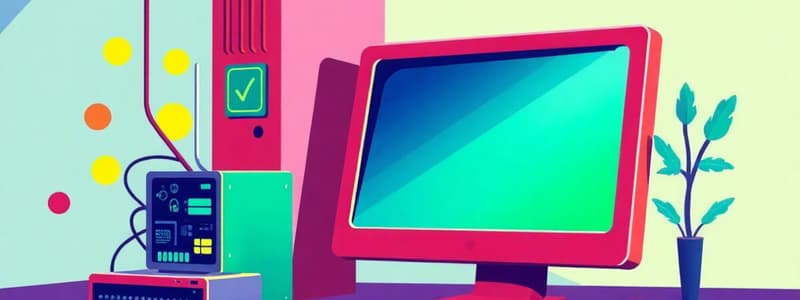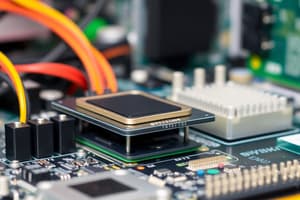Podcast
Questions and Answers
A computer is an electronic device that operates under the control of instructions stored in its own memory.
A computer is an electronic device that operates under the control of instructions stored in its own memory.
True (A)
The information processing cycle does not include input devices.
The information processing cycle does not include input devices.
False (B)
RAM is an example of a permanent memory storage.
RAM is an example of a permanent memory storage.
False (B)
Computers are not prevalent in modern society.
Computers are not prevalent in modern society.
The CPU is responsible for processing information.
The CPU is responsible for processing information.
A computer contains many electric, electronic, and mechanical components known as hardware.
A computer contains many electric, electronic, and mechanical components known as hardware.
Green computing involves increasing the electricity consumed by computers.
Green computing involves increasing the electricity consumed by computers.
A network is a collection of computers and devices connected wirelessly.
A network is a collection of computers and devices connected wirelessly.
The Internet is only used for sending emails.
The Internet is only used for sending emails.
Software, also called a program, tells the computer what tasks to perform.
Software, also called a program, tells the computer what tasks to perform.
Installing software is the process of removing programs from a computer.
Installing software is the process of removing programs from a computer.
A personal computer can perform input, processing, output, and storage activities by itself.
A personal computer can perform input, processing, output, and storage activities by itself.
A game console is a type of supercomputer.
A game console is a type of supercomputer.
A server provides a centralized storage area for programs and data on a network.
A server provides a centralized storage area for programs and data on a network.
A mainframe can handle thousands of connected users simultaneously.
A mainframe can handle thousands of connected users simultaneously.
Supercomputers are capable of processing less than one trillion instructions per second.
Supercomputers are capable of processing less than one trillion instructions per second.
An embedded computer functions as a standalone device.
An embedded computer functions as a standalone device.
Programming involves writing instructions that direct a computer to process data.
Programming involves writing instructions that direct a computer to process data.
Bluetooth is a type of wired connection used by computers.
Bluetooth is a type of wired connection used by computers.
Flashcards are hidden until you start studying
Study Notes
A World of Computers
- Computers are everywhere.
What Is a Computer?
- An electronic device that operates under instructions stored in its memory (RAM)
- Utilizes an Information Processing Cycle: input, processing (CPU), output, storage
The Components of a Computer
- Hardware: Physical components of a computer
- Examples of hardware:
- Input devices: keyboard, mouse, touchscreen
- Output devices: monitor, printer, speakers
- Processing: CPU, motherboard, RAM, ROM, audio card
- Storage: hard drive, SSD, cloud storage
- Communication: modem, network card, router
Advantages and Disadvantages of Using Computers
-
Advantages:
- Speed
- Accuracy
- Storage
- Communication
- Productivity
-
Disadvantages:
- Health risks (repetitive strain injury, eye strain, etc.)
- Privacy
- Security
- Dependence
Green Computing
- Involves reducing electricity consumption and waste generation when using a computer
- Strategies include:
- Recycling
- Manufacturing process regulation
- Extending computer lifespan
- Proper disposal of outdated computers
Networks and the Internet
- A network is a collection of computers and devices connected together, often wirelessly
- The internet is a worldwide collection of networks connecting millions of users
- The internet is used for a variety of purposes like communication, research, and entertainment.
- Social networking websites encourage users to share their interests and content with others.
Computer Software
- Instructions that tell a computer what tasks to perform
- Types of software:
- System software: Operating systems (Windows, macOS, Android)
- Application software: Programs used to perform specific tasks (word processors, spreadsheets, web browsers)
- Installing software involves setting it up to work with the computer and other hardware.
- Programmers develop software by writing instructions for processing data into information.
Categories of Computers
-
Personal Computers:
- Used for personal tasks
- Examples: Desktop computers, laptop computers
- Popular architectures: PC and Apple
-
Mobile Computers and Mobile Devices:
- Portable computers with computing capabilities
- Examples: Laptops, tablets, smartphones
-
Game Consoles:
- Mobile computing devices designed for video games
- Examples: PlayStation, Xbox, Nintendo Switch
-
Servers:
- Control access to resources on a network
- Provide centralized storage for programs, data, and information
-
Mainframes:
- Large and powerful computers
- Can handle thousands of users simultaneously
- Used by large organizations for critical tasks.
-
Supercomputers:
- Fastest and most powerful computers
- Capable of processing massive amounts of data
- Primarily used for scientific research and advanced computing.
-
Embedded Computers:
- Specialized computers designed for specific tasks
- Found in everyday devices like cars, appliances, and medical equipment.
Elements of an Information System
- Hardware: The physical components of the system
- Software: The programs that control the system
- Data: The raw facts and figures processed by the system
- People: The users who interact with the system
- Procedures: The rules and processes used to operate the system
- Network: The communication infrastructure that connects the system components
Examples of Computer Usage
- Business
- Healthcare
- Education
- Entertainment
- Science and Engineering
Computer Applications in Society
-
Positive impacts:
- Communication
- Education
- Job creation
- Innovation
- Healthcare advancements
- Scientific discoveries
-
Negative impacts:
- Privacy concerns
- Security risks
- Unemployment
- Digital divide
- Environmental impact
Summary
- Computers are becoming increasingly ubiquitous and have a significant impact on society.
- Understanding the fundamental concepts of computers and their applications is crucial in today’s technology-driven world.
Studying That Suits You
Use AI to generate personalized quizzes and flashcards to suit your learning preferences.




